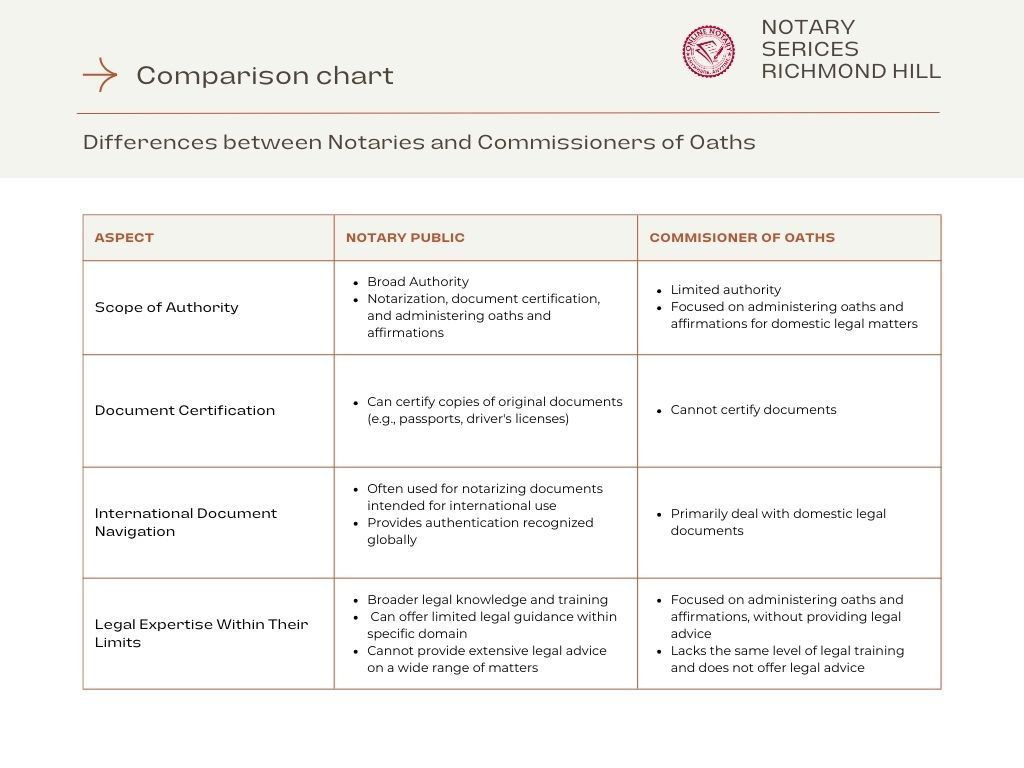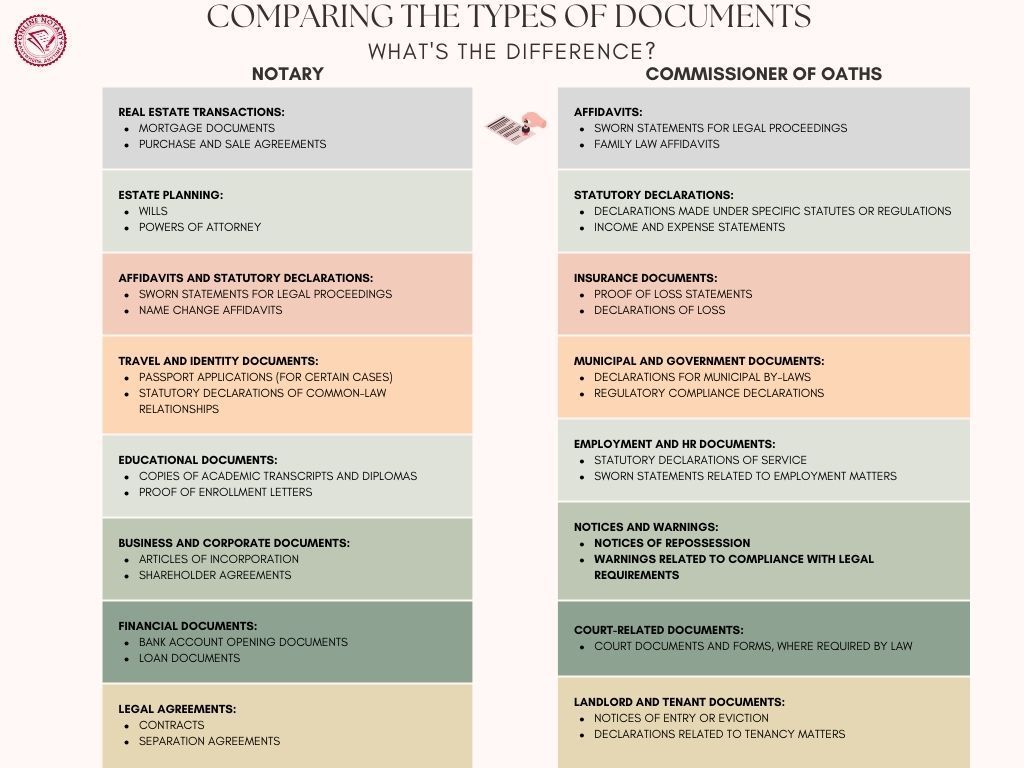Understanding the Differences and Choosing the Right Service for Your Document Needs
When it comes to dealing with legal documents in Ontario, you may encounter the roles of a Notary Public and Commissioners of Oaths. It can be confusing to understand the roles they play and how they differ. Notary Publics and Commissioners of Oaths both ensure that documents are valid and authentic, but they have different responsibilities. This guide will explain the differences between a Notary Public and a Commissioners of Oaths in Ontario, giving you the information, you need to make informed choices for your document requirements. We will also emphasize that Notaries do not provide legal advice.
The Role of a Notary Public
A Notary Public is a legal professional appointed by the provincial government in Ontario to perform various legal services. While they do not provide legal advice, they fulfill crucial functions related to document authentication. Here's a closer look at what a Notary Public does:
1. Notarization
Notarization is one of the primary roles of a Notary Public. This process involves verifying the authenticity of signatures on documents. A Notary Public confirms the identity of the signatories and ensures they are acting of their own free will. Notarization is essential for documents that will be used in foreign jurisdictions or legal transactions.
2. Document Certification
A Notary has the authority to certify copies of original documents. This means they can confirm that a copy is a true and accurate replica of the original. Certified copies are often required for various legal or immigration proceedings, such as visa applications or real estate transactions.
3. Administering Oaths and Affirmations
A Notary can also administer oaths and affirmations. This enables individuals to make sworn statements or affidavits. These statements are used as legal evidence in different proceedings, such as court cases or contractual agreements.
A Commissioner of Oaths
On the other hand, a Commissioner for Taking Oaths or Affidavits has a more limited scope of authority. They are authorized to administer oaths and affirmations and do not provide legal advice or certify documents. Here's a closer look at what a Commissioner of Oaths does:
1. Administering Oaths and Affirmations
The primary responsibility of a Commissioner of Oaths is to administer oaths and affirmations. This allows individuals to make sworn statements, known as affidavits, for various purposes. Commissioners of Oaths validate the truthfulness of these statements, making them legally binding.
2. Verifying Documents
Commissioners of Oaths ensure the truthfulness and accuracy of statements made in documents, such as affidavits, statutory declarations, and sworn statements. They are not authorized to certify documents, notarize signatures, or provide legal advice.

Key Differences Between A Notary and Commissioner of Oaths
1. The Scope of Authority
The most significant difference lies in the scope of authority. A Notary Public has a broader range of legal functions. They can perform notarization, document certification, and administer oaths and affirmations. In contrast, Commissioners of Oaths have more specific authority, primarily focusing on administering oaths and affirmations.
2. Document Certification
A Notary has the unique ability to certify copies of original documents, such as passports, driver's licenses, or academic transcripts. This service is not within the jurisdiction of Commissioners of Oaths, who are limited to administering oaths and affirmations.
3. International Document Navigation
Notary Publics are often sought for notarizing documents intended for international use. The seal and signature of a Notary Public provide a level of authentication recognized worldwide. This is particularly crucial for documents used in foreign legal proceedings, real estate transactions, or visa applications. In contrast, Commissioners of Oaths typically handle matters concerning domestic legal documents.
4. Legal Expertise Within Their Limits
A Notary Public has broader legal knowledge and training compared to Commissioners of Oaths. While A Notary cannot provide extensive legal advice on a wide range of matters, they can offer legal guidance within their specific domain. Most Notaries in Ontario are either lawyers or licensed Paralegals. Commissioners of Oaths do not possess the same level of legal training and do not provide legal advice.

Notary Services Richmond Hill
Commitment to Compliance and Security
We place a high premium on compliance with legal standards and security measures. Let's delve deeper into our commitment to ensuring your documents are handled with the utmost care.
Compliance with Regulations
Our notaries are well-versed in the ever-evolving legal landscape. They stay informed about the latest regulations and requirements to ensure that your documents meet the necessary standards for submission. This commitment to compliance ensures that your notarized documents will be accepted without hesitation.
Cutting-Edge Security Measures
Security is a top priority for Online Notary Services Richmond Hill. Our process employs state-of-the-art encryption and security protocols to safeguard the confidentiality and integrity of your documents. Rest assured that your sensitive information is protected throughout the online notarization process.
Verification of Identity
Online notarization may raise concerns about identity verification. We address this by rigorously authenticating your identity during the virtual meeting with a notary. This ensures that the notarization process is secure and that the document's authenticity is maintained.












